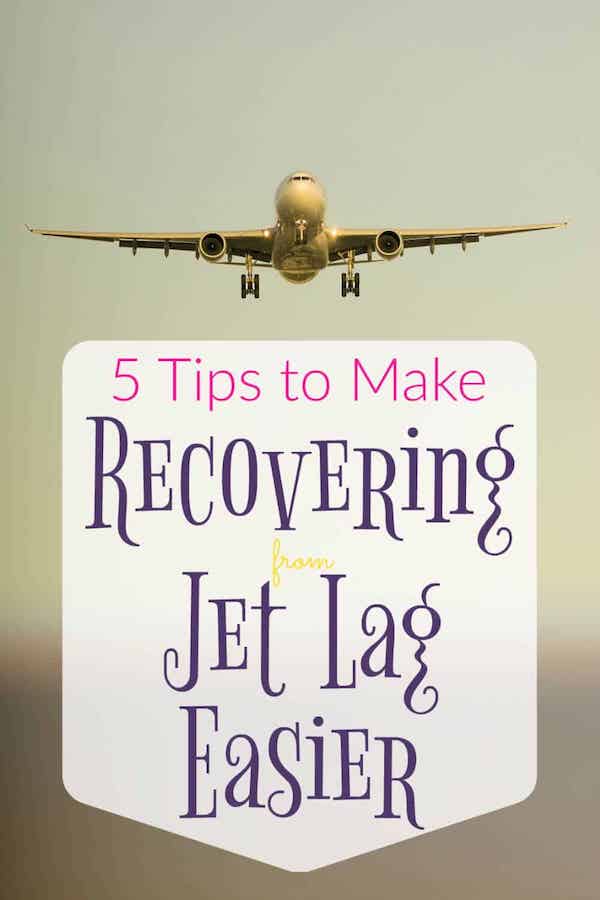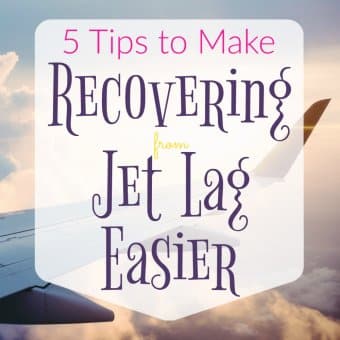Holidaying overseas can be quite stressful, especially when traveling with children. If you are traveling within the same or similar time zone, things aren’t so bad, but when jet lag is on the table, it makes things MUCH harder. If you travel to a different time zone – the general rule of thumb is that traveling east is worse than west. Interestingly studies have found that recovering from jet lag takes a full day to get used to for each time zone you travel through.

How do you deal with your own jetlag while also dealing with your kids? It makes getting out and about and seeing the sights harder when you are a tired and jetlagged family. Or as my kids explain it – ‘having confused bodies’. It is such a great all encompassing explanation because not only is your sleep messed up but so are your eating and activity routines as well.
Leave for your vacation/return home well rested
The first thing I always suggest is to make sure you and your children are well rested before you travel. The night before make sure everyone goes to bed early and has a nice full night of sleep. Being well rested ensures that you will bounce back a lot faster from the time change and help you sleep as well as you can. If you aren’t well rested you’ll struggle more to fall asleep and stay asleep.
I tend to suggest to the families I work with that if you are going to be in your new time zone for more than 3-5 days, then it is definitely best to get used to the new time zone, and the quicker that you work on that the better.
Plan in advance
This only really works if you don’t have a huge time difference between home and your chosen destination. So if you are going somewhere with a few hours time difference give it a try, but if you are planning a trip from the US to Asia or something like this, it might be better to just adjust once there. Although, I have known people who’ve even tried it for such big time zone changes and swear it worked well! They did however have time off from work and school to give it a try first.
If planning in advance, start around 2 weeks before you are due to travel. Shift your schedule by half an hour increments every few days towards your holiday destination’s time zone. It is important to wait a few days each time to give your body time to adjust. It is important to change your eating schedule along with your sleep schedule so you don’t get hungry at the wrong times and make sleeping difficulty.
Start your daily routine in the new time zone the next day
Wake up at your normal time the next day and follow a normal sleep and eating schedule. Your kids should nap and go to bed around their normal time. If they don’t nap well though, don’t be afraid of an early bedtime. Along with that, make sure you get out in the morning sun to re-set your body clock. It is a perfect excuse to see one of those outdoor sites you put on your must see list!
Nighttime is ALWAYS nighttime
You and your kids will probably wake up at odd times of the night for a few days while getting used to your new time zone. It can be tempting to get up and start the day, put on the TV or read something on the phone. The best thing to do is treat night time as nighttime. Keep things quite, dark and low key, so it teaches your bodies that this time is meant for sleeping. Darkness also stimulates the production of Melatonin; which is incredibly important for sleep. Blackout blinds can be great to aid in the darkness factor and can ensure that no sunlight streams in during the early morning hours and makes your brain think it is wake up time. This is especially important for kids who are very sensitive to light.
Naps are important
A short nap during the day can help even a non-napping child or adult make it through to an appropriate bedtime. I often find this is key when getting back into the normal time zone at home quicker. It helps you and your kids become well rested, which in tern helps them sleep better and at a more appropriate time each night while adjusting.
Jet lag is always the part of our vacations that I dread. I wish I could tell you that we can completely do away with jet lag, but it just isn’t possible. Instead, if you follow the tips I’ve provided above I find that jet lag is as manageable as it can be. Doing all of the above I tend to get my family recovered from jet lag within 5 days, even from a trip all the way to Australia!





